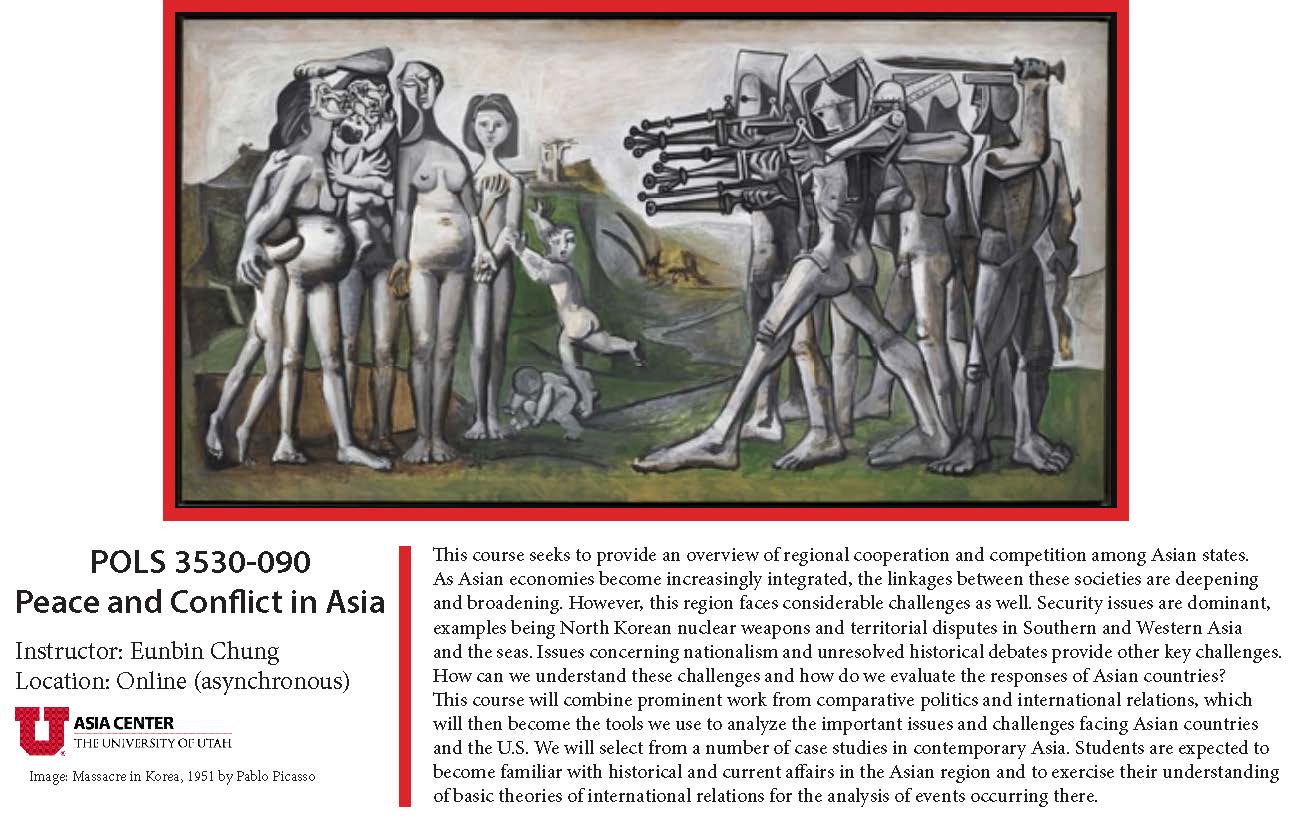Fall 2021 Featured Classes
POLS 3530-090 | Peace and Conflict in Asia
Instructor: Eunbin Chung
Location: Online (Asynchronous)
This course seeks to provide an overview of regional cooperation and competition among
Asian states. As Asian economies become increasingly integrated, the linkages between
these societies are deepening and broadening. However, this region faces considerable
challenges as well. Security issues are dominant, examples being North Korean nuclear
weapons and territorial disputes in Southern and Western Asia and the seas. Issues
concerning nationalism and unresolved historical debates provide other key challenges.
How can we understand these challenges and how do we evaluate the responses of Asian
countries? This course will combine prominent work from comparative politics and international
relations, which will then become the tools we use to analyze the important issues
and challenges facing Asian countries and the U.S. We will select from a number of
case studies in contemporary Asia. Students are expected to become familiar with historical
and current affairs in the Asian region and to exercise their understanding of basic
theories of international relations for the analysis of events occurring there.
HIST 3540 | The Japanese Empire
Instructor: Ryan Moran
Days: Monday/Wednesday
Time: 11:50 am- 1:10 pm
Location: GC 5680
Location: GC 5680
This course focuses on the Japanese empire, which formally began in 1895 and ended
in 1945. The Japanese empire has had profound implications for the diplomatic relations
amongst nations on both sides of the Pacific Ocean. While this course spends the most
amount of time dealing with the Japanese empire, it will also consider how this empire
overlapped with and intersected the expansion of the US empire. While historians and
scholars have often seen these two powers as diametrically opposed - with the US supporting
racial progress and freedom and the Japanese focuses on blood purity and exclusion
- we will witness some remarkable similarities in how the two powers dealt with minority
populations amidst the buildup to war. This course will also ask you to consider the
ways in which minority discourses either shifted and/or remained the same in the postwar
period. In other words, how might have the legacies of Japanese imperialism continued
into the postwar period. Finally, the course will end by asking us how we as citizens
and scholars should attempt to remember war and empire.
ENGL 3780 | Literatures of Global Asias
Instructor: David Roh
Days: Tuesday/Thursday
Time: 10:45 am- 12:05 pm
Location: Canvas
Location: Canvas
If the nineteenth century was marked by a cultural and political focus on the United
Kingdom, and the twentieth century by the United States, then what does the twenty-first
bring? In the fall of 2011, the Obama administration introduced a new direction in
foreign policy—the “pivot” toward the Pacific as the United States shifted its gaze
to the Asia Pacific. The administration’s declaration was the culmination of a series
of maneuvers that long preceded it, but it would mark the beginning of the twenty-first
century’s focus on the rise of global Asias. However, there are nuances that can only
be captured through a cultural and literary lens; the Asia Pacific is not a monolith,
but many different countries with a wide array of cultures and histories. This course
focuses on Asian and Asian American literatures that are global in scope, scale, and
imagination; it interrogates the transnational flow of Asian and Asian American labor,
capital, bodies, and culture.
PHIL 4140/5193/6140 | Classical Chinese Philosophy
Instructor: Eric Hutton
Days: Monday/Wednesday
Time: 1:20-2:45 pm
Location: CRCC 215
Location: CRCC 215
This course will survey seven main thinkers of the “classical” period of Chinese philosophy
(approx. 550-221 BCE): Kongzi (Confucius), Mozi, Mengzi (Mencius), Laozi, Zhuangzi,
Xunzi, and Han Feizi. These thinkers developed a complex and rich debate about ethics,
human nature, moral psychology, and self-cultivation. The positions they established
greatly influenced later Chinese history, including the development of Buddhism, and
they influenced philosophical discourse in Japan, Korea, and Vietnam as well. Thus,
understanding these early debates is an important stepping-stone for understanding
East Asian thought generally. Readings will consist mainly of primary texts in translation,
with some secondary literature. No previous knowledge of Chinese language or history
is necessary.




